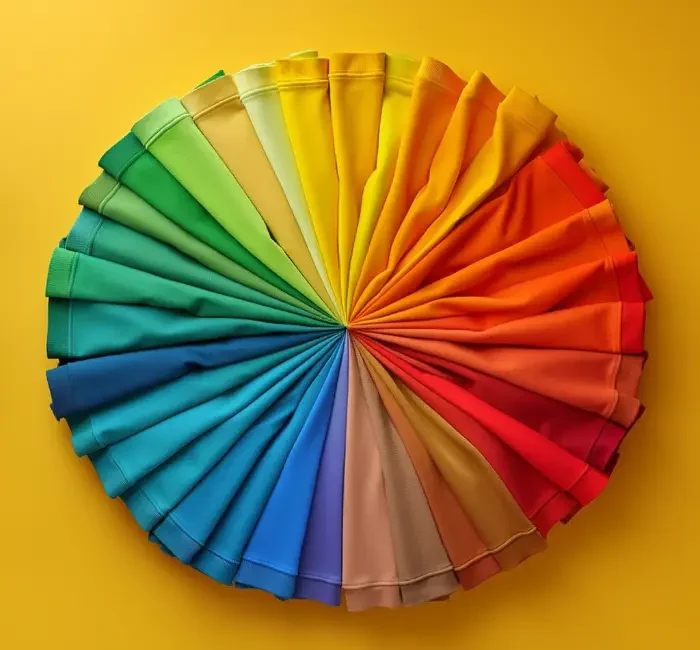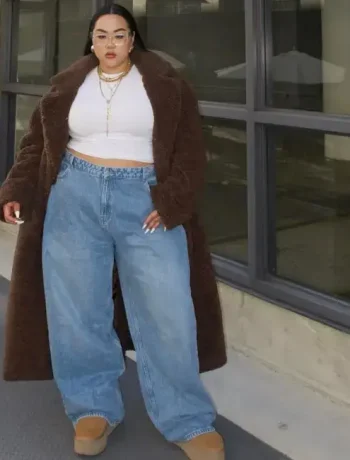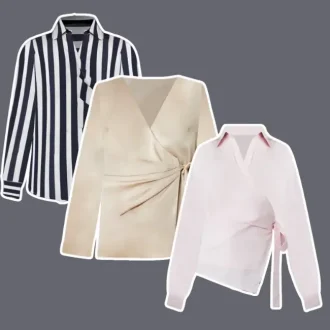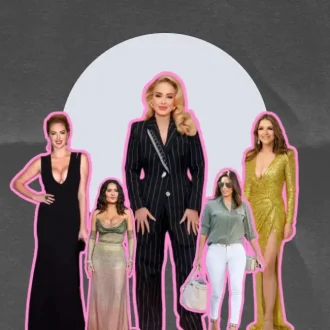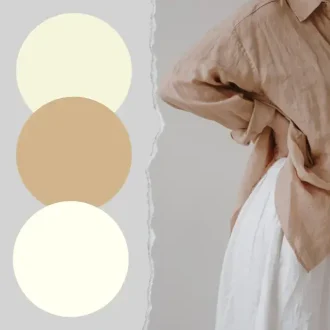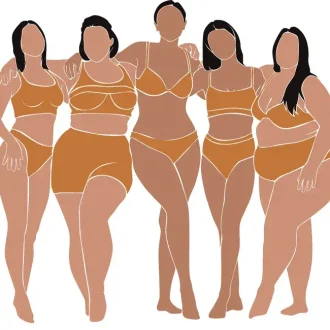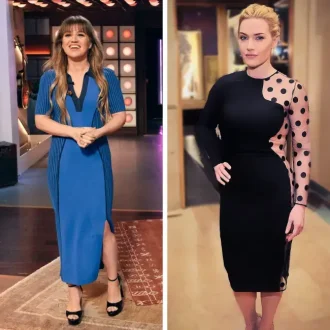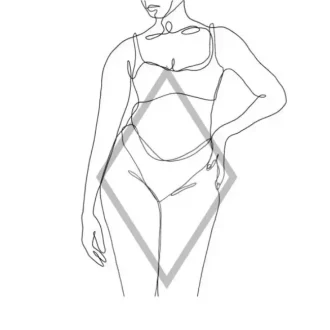The understanding of Color Theory for Round Body Shapes is fundamental to all those who want to increase their wardrobes by clothing that serves to flatter and complement their figure.
One of the greatest benefits could be using color in the round body type, whose full torsos and rounded shoulders. The color theory takes into account much more than choosing the color one likes the most. It stands in place for the power of color to sculpt your body and the perception of sight.
This article is laid out to show you how different colors and their combinations can either accentuate your features or reduce them, so you have all the information you need to make the choices for your body shape the most flattering.
Dress for the season, for a special occasion, or just dressing every day, apply these principles with this knowledge to be most confident about the style you present.
Understanding Color Theory for Round Body Shapes
Color theory is one of the main basic foundations in the domain of fashion design and styling. It assists in guiding designers on the use of color to bring out pleasing combinations and at the same time effecting the heightening of personal style and presentation of users. Basic knowledge of color theory can help tremendously in how clothes “work” with round body shapes.
Basic Principles of Color Theory
Definitions of Key Terms:
Hue refers to pure spectrum colors that are usually named by hue, such as red, blue, or yellow. All of these refer to primary and secondary colors.
Saturation refers to the intensity or purity of the color. High saturation levels will give the fullest, richest, most vivid hue of the color, while lower levels of saturation make the color look more greying and dulling.
Value (or lightness) refers to how light or dark a color looks. Brighter colors have high values and generally make things look more full or accentuated, while the darker colors with low values are of a slimming nature.
How Colors Interact on the Color Wheel
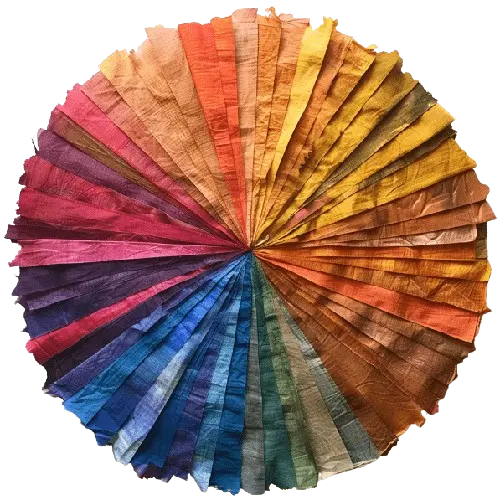
The color wheel is a visual representation of colors “in their chromatic relationship,” one after the other. The wheel begins with primary colors, and secondary and tertiary fill in between the way one would caulk a seam. Color relationships are as simple as knowing the rules: complementary (opposite each other on the wheel), analogous (two or more colors that lie next to each other on the wheel), and triadic (three colors forming an equidistant triangle on the wheel).
Understanding Warm vs. Cool Colors
Warm colors of red, orange, and yellow span emotions of heat, cheer, anger, and anger/hostility. They are generally applied to the attention of somebody and may give the effect that large surfaces are nearer or bigger when applied to them.
In general, the cool colors such as blue, green, purple, or violet would be tending to have the effect of calming down with the feeling of larger space and more open space. Compared to warm colors, they offer quite an ideal slim silhouette.
Psychological Effects of Colors:
Influence on Mood and Perception: The colors also influence perceptions of the mood towards everything and even influence our appearance of body shape and size that other people perceive. For example, they perceive the dark colors of black and navy to be very slimming and elegant, while others find bright colors like yellow to be energizing, drawing attention to an area but allowing the body part to appear as though it has gained in size and fat.
Examples of Colors That Typically Flatter or Detract:
The flattering colors for rounder body shapes usually come with deep blues, emerald greens, and rich purples that are able to create a slim effect while enhancing elegance. On the other side, some of the colors may be unfavorable, like the colors bright yellow and neon, which appear to actually expand the area of the body in which they are worn, given their brightness and high visibility.
Color Dynamics for Round Shapes
How Colors Manipulate Visual Perception
Color may help dramatically change the way body shapes are seen, so it can be used strategically, and the choice of color is a key factor in aiding the enhancement of round body shapes.
How Dark and Light Colors Affect Body Shape Appearance
Dark colors: Usually characterized by their property to absorb light and traditionally slimming to the body, include navy, charcoal, and black. All these colors make areas where they cover body parts look small and defined.
Light colors: On the other hand, light color reflects light, which may make any part of the body seem bigger than it is. Though if used cleverly, it can highlight areas one would like to bring out.
The Impact of Bright vs. Muted Colors
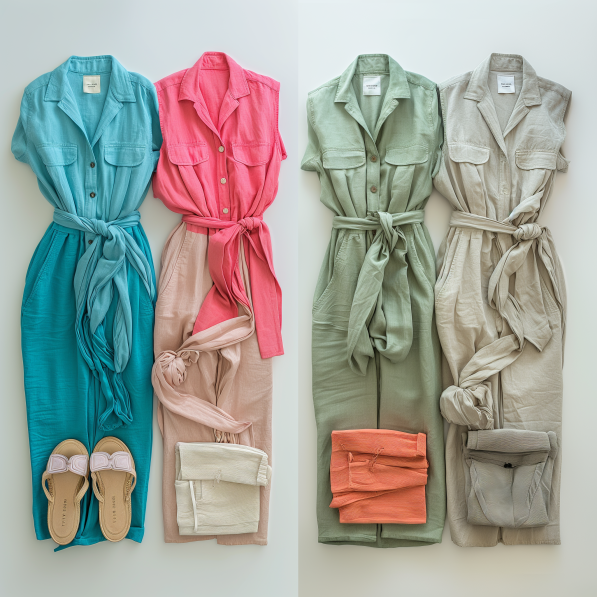
Bright Colors: These are screaming colors and can be used for highlighting the areas the colors will cover. They work best for the body part that an individual would want to highlight.
Muted colors: perfect for parts of your body that you want to play down, they stay in the background and just maybe help to create a slimmer silhouette.
Color blocking can be an effective way of sculpting and flattering round body shapes by eye-drawing preferred areas and illusion creation of shape.
Techniques to Draw the Eye Vertically Rather Than Horizontally
Utilizing vertical stripes or panels in garments can visually elongate the body, making it appear taller and slimmer. Basically, use of vertical zippers, seams, or prints incorporated into the elements can be able to draw the eye up and down, thus slimming the figure.
Using Monochrome Outfits to Elongate the Figure: Dressing in a single color creates an uninterrupted vertical line, making one appear taller and more fluid. This may be achieved by tints of the same color or by subtle changes in texture of this same hue to give interest and depth but not make any interference to the vertical movement.
Ideal Color Palettes

Recommended Colors and Combinations
In this connection, it is really worth taking into account the above-mentioned recommendations, which are related to the right choice of colors and their effective combination in order to bring considerable benefit for the round body shapes.
Deep Blues: Navy or midnight blue provides a slimming effect while offering more visual interest than black.
Rich Purples: Shades like eggplant and plum are flattering and can add depth to your wardrobe.
Forest Green: This deep green shade is as versatile as it is flattering, working well with many skin tones.
Burgundy and Wine: These colors add warmth and richness to outfits, creating a luxurious and slimming appearance.
Combining Colors for a Harmonious Look
Choose the similar color schemes (colors that are close on the color wheel) in order to make your outfit look pleasing. For example, wear a wine-colored skirt with a top of burgundy.
Include neutral tones such as gray, beige, or navy as bases to mix with richer hues for a well-balanced and chic space.
Colors to Avoid
These can enhance, while the latter might not be as flattering for a round body shape. Knowing which to stay away from or at least use minimally can refine your style choices.
Colors and Patterns That Might Not Complement Round Body Shapes:
Bright yellows and neon colors can, in fact, draw undue attention to the outlines of your body by accenting areas that you would rather play down.
Large, Bold Patterns: Oversized patterns can overwhelm the figure and make the body appear larger.
Explanation of Why Certain Colors Should Be Avoided or Used Minimally:
Over-saturated and bright colors can add just as unwanted volume as overlarge patterns can warp the body’s proportions. It will give a distorted version of the silhouette that somebody might be wanting to achieve.
Practical Tips and Outfit Ideas
This section applies color theory to actual fashion strategies, providing seasonal color suggestions, creating flexible outfits for round shapes, and finally, suggestions on how to pick and put on accessories that will flatter round body shapes.
Seasonal Color Recommendations
Understanding which colors to embrace each season can help maintain a flattering wardrobe year-round:
Spring:
- Soft Pastels: Light pink, baby blue, and mint green are refreshing spring choices as they have the tendency to lighten up the whole look without feeling too overwhelming.
- Vibrant Greens: Reflect the renewal of spring with shades of green that emphasize new beginnings and vitality.
Summer:
- Bright Blues and Aquas: These shades of blues and aquas represent summer skies and cool waters, good to set off your summer tan yet keep your look breezy and light.
- Coral and Peach: These colors are warm but still soft and flatter the skin tone, doing great for a rounded body shape by giving a somewhat flattering contrast.
Fall:
- Rich Earth Tones: This would include burnt oranges, deep yellows, and olive greens that mirror changing leaves and make up a warm palette to flatter most skin tones.
- Burgundy and Teal: These deeper tones offer sophistication and warmth, perfect for transitioning into cooler weather.
Winter:
- Deep Jewel Tones: The emerald, ruby, and sapphire hues not only evoke the holiday season but also command attention and give confidence.
- Classic Neutrals: Versatile enough to layer with everything, from deep browns and grays to navy, it all eases a tougher appearance into the colder months.
Outfit Ideas Based on Color Theory
Casual:
- Weekend Look: A navy blue jumper, some dark denim jeans, and pulling the face into focus using light accessories, like a soft silver necklace.
- Day Out: Emerald green wrap dress, perfect for adding shape and enhancing curves subtly.
Formal:
- Evening Event: A floor-length burgundy gown; accessorize with gold earrings and a bracelet to add a touch of elegance.
- Wedding Guest: Deep sapphire midi dress with a slim belt to define the waist.
Business:
- Office Wear: A charcoal gray suit paired with a light blue blouse for a professional yet stylish appearance.
- Conference Attire: A plum blazer over a cream-colored sheath dress, projecting confidence without being overly bold.
Tips on Selecting Accessories Based on Color Theory
- Complementary Accessories: Consider the accessories that match or work well with the main colors in an outfit, but they should not fight for attention with the outfit itself. For instance, a navy dress may be well complemented by a mustard-yellow scarf.
- Metallics: Think of the metallics, such as silver, gold, and bronze, as neutrals. They can be neutrals in your outfits and, moreover, bring lightness to your clothes.
- Strategic Placement: Place your accessories right in order to draw attention to your best parts, like a statement necklace to show off the neckline or a belt to cinch in your waist.
Conclusion
How one can dress to bring out the best of their looks with confidence using the Color Theory for Round Body Shapes. All this totally revolutionizes your wardrobe in a way that you know what colors to adopt and avoid, so that each and every outfit looks good with your shape and matches your style preference.
So, the right colors do take out your best features and affect the people’s perception of you; hence, in fact, color is one of the if not the most important element in your fashion arsenal.
Mix and match these, experiment with new combinations and above all, have a lot of fun as you do so, trying out these new looks and finding what really flatters your round body shape.
For an even more in-depth exploration of styling specifically designed for your figure, don’t miss our comprehensive pillar article on “How to Dress for Round Body Shape.” Expand your fashion knowledge and embrace a wardrobe that celebrates and enhances your unique silhouette.
